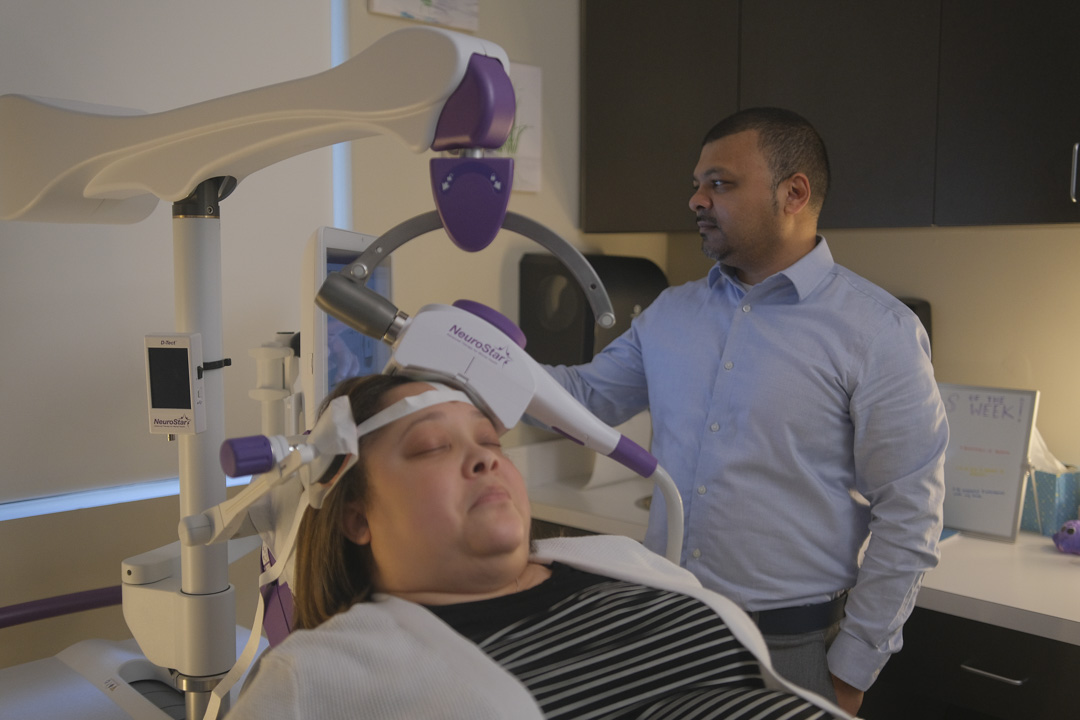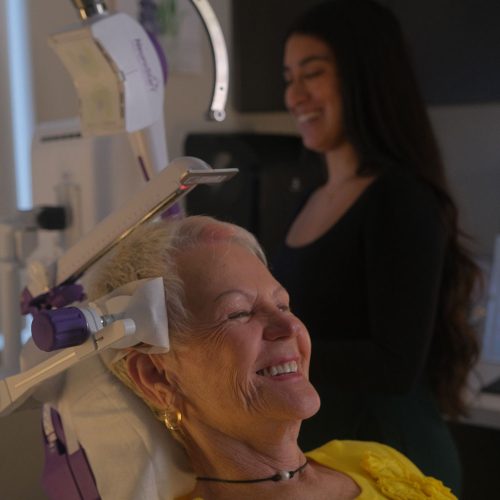TMS Therapy in Lake Nona, Orlando
TMS therapy is a revolutionary, non-invasive treatment for depression that goes beyond traditional approaches. Our FDA-cleared TMS therapy is designed to offer you relief without the side effects associated with medication.

Transmagnetic Therapy
Contact Us to Schedule a Consultation Today.

TMS Therapy
TMS therapy is a revolutionary, non-invasive treatment for depression that goes beyond traditional approaches. Our FDA-cleared TMS therapy is designed to offer you relief without the side effects associated with medication.
Transcranial Magnetic Stimulation, or TMS, is a non-invasive treatment that uses gentle magnetic pulses to stimulate areas of the brain linked to mood and emotional regulation. Unlike medications, TMS doesn’t circulate through your whole body; it works by directly stimulating your brain’s natural activity. It’s FDA-approved and widely used for depression that has not improved with medications or therapy alone. At OneMed Clinic in Lake Nona, Orlando, we use TMS as part of an integrated approach to help patients regain balance, clarity, and hope.
TMS therapy is recommended when traditional treatments, such as antidepressants or talk therapy, have not been effective on their own. Many people come to us feeling discouraged after trying multiple medications or struggling with side effects. TMS offers a new path forward, one that directly targets brain activity without requiring medication.
TMS works by sending painless, focused magnetic pulses into specific areas of the brain that control mood. Think of it as “waking up” or “resetting” brain cells that are underactive in depression. Over time, repeated stimulation helps the brain create healthier patterns that improve mood and emotional well-being.
Specific Nerve Targeting
During treatment, we guide magnetic pulses to the exact nerve cells responsible for mood regulation. This precision ensures that the therapy targets only the areas that matter.
Brain Pattern Alteration
With repeated sessions, TMS encourages new activity patterns in the brain. These changes can reduce symptoms of depression and anxiety, and in many cases, patients describe feeling lighter, more energized, and better able to enjoy daily life again.
Yes. TMS is FDA-approved and has been studied extensively for safety. Unlike medications, it doesn’t affect your entire body; it works locally in the brain. The most common side effects are mild, such as temporary scalp discomfort or a light headache, and these usually fade after the first few sessions.
No. TMS is not painful. While there may be some minor discomfort at the treatment site (where the device touches your head), it generally subsides within the first week or treatment. There is no sedation or impact on your alertness. You can read, watch TV, or talk with your treatment coordinator during your session, and you can drive home immediately after.
The pulses are akin to a tapping sensation on your scalp. Many patients report that while the sensation requires some adjustment, it is generally not painful. Should you experience discomfort, please inform us so we can make the necessary adjustments.
In summary, most patients describe the treatment as easy and tolerable.
Conditions treated with medical TMS
At OneMed Clinic in Lake Nona, Orlando, we primarily use TMS therapy to treat major depressive disorder (MDD), especially when medications or therapy alone have not provided enough relief. But TMS is not limited to depression. Research and clinical practice show that it can also support other conditions linked to mood, focus, and brain activity.
TMS is FDA-approved for:
- Major Depressive Disorder (MDD)
- Treatment-resistant depression (when medications haven’t worked)
- Obsessive-Compulsive Disorder (OCD)
TMS is being studied and may also help with:
- Generalized Anxiety Disorder (GAD)
- Post-Traumatic Stress Disorder (PTSD)
- Bipolar depression (depressive episodes in bipolar disorder)
- Chronic pain conditions (such as fibromyalgia)
- Migraine prevention
- Parkinson’s disease symptoms
- ADHD (Attention Deficit Hyperactivity Disorder)
- Post-stroke rehabilitation
At OneMed, our Board-Certified physicians carefully evaluate whether TMS is right for you. While depression and OCD are the most common approved uses, many patients also notice improvements in anxiety, focus, and overall emotional balance.
Yes, TMS can be helpful for anxiety. Unfortunately, many patients with depression also experience anxiety symptoms, and when depression improves with TMS, anxiety often improves as well. Stimulating specific brain regions helps calm overactive networks linked to worry and tension. At OneMed, we adapt TMS treatment to your needs, so if anxiety is part of your struggle, TMS may offer relief.
At this moment, TMS is being studied as a treatment for ADHD, and early findings are encouraging. By stimulating areas of the brain that regulate focus and attention, TMS may help improve concentration and reduce impulsivity. While it is not yet FDA-approved specifically for ADHD, some patients receiving TMS for depression report clearer thinking and better attention as an added benefit.

Is TMS therapy right for you?

You may qualify for TMS therapy if you have depression or another condition that has not improved with medications, therapy, or both. Insurance companies typically require documentation that you’ve tried at least two antidepressants without success. At OneMed, we review your medical history, current symptoms, and treatment goals to determine whether TMS is a safe and effective option for you
TMS is not recommended for people who have metal implants in or near the head, since the magnetic pulses can interfere with these devices. It is also not recommended for people with a history of seizures that are uncontrollable. Our physicians carefully screen every patient to make sure TMS is safe before beginning treatment.
People who are pregnant, have unstable medical conditions, or have certain types of brain injuries may not be candidates for TMS. At OneMed, safety comes first. If you’re unsure whether TMS is right for you, our team will walk you through all risks and alternatives before moving forward.
- Non-drug treatment: No daily pills, no systemic side effects.
- FDA-approved: Safe, proven, and widely used for depression.
- Highly effective: Many patients experience long-lasting relief.
- Insurance coverage available: Most major providers include TMS.
- Convenient sessions: Quick treatments with no downtime.
The main drawback of TMS is that it requires multiple sessions, typically five times per week over several weeks. Some patients may also notice mild side effects such as scalp discomfort or headaches during the first few sessions. For most, these effects are temporary and fade quickly.
Pros:
- Safe and non-invasive
- Drug-free option for depression
- Effective when medications haven’t worked
- No memory loss or sedation
- Minimal side effects
Cons:
- Requires time commitment for multiple sessions
- Mild temporary side effects like scalp discomfort
- Not suitable for people with certain metal implants or seizure conditions
Yes. TMS is one of the most effective treatments available for treatment-resistant depression. Studies show that many patients experience a significant reduction in symptoms, and some achieve full remission. At OneMed, we’ve seen patients who struggled for years finally find relief through TMS therapy.
Most of our patients tolerate TMS very well. The most common side effects they experience are a light headache during the session or a mild scalp discomfort, which usually improves after the first week. Unlike medications, TMS does not cause traditional side effects of medications like weight gain, sexual side effects, or drowsiness. Serious side effects, such as seizures, are extremely rare.
How is a typical treatment course
TMS therapy near me
5
Treatments / week
7
Weeks
20
Minutes per typical
treatment session
36
Sessions
THE TRANSMAGNETIC THERAPY PROCESS
TMS therapy near Lake Nona, FL
1
Referral to OneMed
2
Consultation Visit
3
Insurance Verification
4
TMS Treatment
Discover TMS Therapy
We manage insurance for you
We manage insurance for you
Yes, in most cases, insurance will pay for TMS therapy. Because it is an FDA-approved treatment for major depressive disorder and obsessive-compulsive disorder, many insurance companies recognize its medical necessity. At OneMed Clinic in Lake Nona, our team handles the paperwork and communicates directly with your insurance provider so you don’t have to manage it alone.
Most major insurance providers (including Medicare) cover TMS therapy when specific medical criteria are met, such as a documented history of trying antidepressant medications without sufficient improvement. Coverage can vary, which is why our care team verifies your benefits before you begin treatment. We want you to feel fully informed about costs and coverage so you can focus on your health, not on paperwork.

Determine if TMS is Suitable for You
What should I expect on my first session
TMS near me
60-90
Minutes
How is the Magnet Strength Determined?
We begin by conducting a test to find your motor threshold, defined as the level of magnetic field strength that elicits movement in your right thumb. This test determines the magnetic field strength for your treatment, ensuring it is personalized to administer the proper treatment dose.
Earplugs are provided
You may bring non-metallic headphones
to listen to music.
Your first TMS Therapy
TMS treatment: Exploring a Typical Session
Each session lasts between 18 to 20 minutes and is conducted in private individual treatment rooms within our centers.
We adhere to stringent COVID-19 safety protocols.
20
Minutes
How long does TMS last?
The effects of TMS therapy can last for months or even years after completing a full treatment course. Many patients enjoy long-term relief from depression and anxiety symptoms. In some cases, a “maintenance” session may be recommended if symptoms return, but most people experience a meaningful improvement that lasts well beyond the treatment period.
Is 20 sessions of TMS enough?
For most patients, 20 sessions are not enough to achieve lasting results. A full treatment course usually involves 36 sessions over 7 weeks. Each session builds on the previous one. Consistency trains the brain to create new, healthier patterns. Stopping too early can limit effectiveness, which is why we encourage completing the full course of care for the best outcome.
Take time for yourself
Read, play on your phone, watch TV, meditate.

Neuro Star in Orlando, FL
NeuroStar depression therapy is FDA-approved and specifically designed for people with treatment-resistant depression. Unlike medications that circulate through your entire body, NeuroStar delivers gentle magnetic pulses directly to underactive areas of the brain. This non-invasive, drug-free approach helps “reset” brain activity and restore healthier mood patterns.
At OneMed, we provide NeuroStar therapy in a safe, comfortable environment. Sessions are quick, and you can return to your normal activities immediately afterward.
NeuroStar works by stimulating the left prefrontal cortex, this area of the brain is often underactive in depression. By sending repeated, focused pulses, NeuroStar encourages brain cells to fire and create stronger connections. Over time, this stimulation improves mood and reduces depressive symptoms.
Many of our patients describe it as finally lifting a heavy weight they’ve carried for years. Some notice small improvements within the first few weeks, while others experience steady progress over the full course of treatment.
Is NeuroStar right for me? CLICK HERE to Find out (PHQ-10 Self-Assessment Health Questionnaire)
Transcranial Magnetic Stimulation For Depression
TMS near Lake Nona, FL
Depression is more than feeling sad; it’s a medical condition that can drain your energy, affect your sleep, and make daily life feel overwhelming. For many people, medications or talk therapy bring relief. But when these treatments aren’t enough, Transcranial Magnetic Stimulation (TMS) offers a safe, proven alternative.
Curious About TMS Treatment for Depression?
We can help you find the best treatment tailored to your needs. Let’s talk.

TMS is different from medications and talk therapy. Medications aren’t as customizable — they may not work for genetic reasons and could cause moderate to severe side effects.
Symptoms of depression can also interfere with the comfort and effectiveness of talk therapy.
TMS targets the area of the brain that is believed to regulate mood to treat depression at its neurological source.
TMS does not hurt. You may have a mild headache during the first week which will subside. This can be addressed with as needed Advil. It feels like a tapping sensation on your head.
Each patient is different and some respond within the first few treatments and others need to complete the entire 36. The standard approach is to complete the full series – 36 sessions for it address your symptoms. How do you know it is working ? You will begin to feel happy, motivated, improved energy levels, sleep better, improved libido, and more importantly you will feel like you’re living your life to its fullest potential.
The first step to beginning treating a patient is to ensure that the first day is done precisely. This is known as the mapping day which is the key to success for the other 35 sessions to be purposeful. Our team invests that time up front to make sure day 1 is as close to perfect as we can achieve and we do so using the advanced technology of the neurostar machine and the experience of our physicians. Once we know your mapping settings on day 1 we replicate it each time for your treatment sessions.
While patients do find remission from undergoing TMS therapy the decision to stop medications is done on a case by case basis. It is done with careful supervision and involvement of you, the patient, and psychiatrist. Some medications can’t be abruptly stopped so they may need to be tapered off.
Optimistically, we wish for all our treated patients to live their life in remission. If however your depression does come back, we can always pursue another round of TMS. It is not unheard of for patients to come back in the distant future to repeat the treatment. This is sometimes referred to as maintenance TMS.
No. While TMS is safe and has minimal side effects, ECT requires general anesthesia which can carry some risk.
To date, there is no evidence that TMS causes any kind of long-term damage to the brain. TMS does carry a very minor risk or seizure during treatment, specifically less than 0.1%. This risk seems to be more associated with those who are already at risk of seizure, whether due to a medication, a chronic condition such as epilepsy, or secondary to drug and alcohol use.

Does TMS actually work?
For some patients, the improvements from TMS can be long-lasting, even years after treatment. While depression can return over time, many people maintain their results without the need for daily medication. In cases where symptoms come back, “maintenance” sessions may help keep results steady.
The benefits of TMS often last 6 months to a year or more after a full course of therapy. Everyone responds differently, but many patients enjoy long-term relief. If symptoms return, additional booster sessions can extend the benefits.
Harvard Health reports that 50% to 60% of patients with treatment-resistant depression see a meaningful response from TMS, and roughly one-third achieve full remission.
Varying by protocol:
- Repetitive TMS (rTMS): Around 50% respond, with over 30% achieving remission. Cognitive FX+1
- Deep TMS (dTMS): Higher efficacy—82% response rate and 65% remission after 30 sessions. Even at 20 sessions, 74% response, 58% remission. Cognitive FX+1
Real-world data (UCLA study, 2023): Shows 54% of patients exhibit a clinical response (defined as ≥ 50% improvement).UCLA Health
TMS is still gaining awareness outside of medical circles. While it has been FDA-approved since 2008 and used in millions of treatments, many people simply haven’t heard of it. Some assume it’s similar to ECT (electroconvulsive therapy), but it’s very different. TMS is non-invasive, drug-free, and does not require anesthesia or cause memory loss. At OneMed, part of our mission is to educate the Orlando community about this safe and effective option.
TMS Therapy Cost FAQ’s
In Orlando, the cost of a single TMS session typically ranges from $250 to $400, depending on the provider and insurance coverage. At OneMed Clinic in Lake Nona, most of our patients use insurance, which significantly lowers or eliminates out-of-pocket expenses. Before starting treatment, our team verifies your benefits and gives you a clear breakdown of costs so there are no surprises.
Without insurance, a full course of TMS therapy in Florida (about 36 sessions) can cost between $6,000 and $12,000. The good news is that most major insurance providers, including Medicare, now cover TMS for treatment-resistant depression. At OneMed, we manage the insurance process for you and help patients maximize coverage so they can focus on getting better, not on the bills.
Yes, for many patients, TMS is absolutely worth the investment. If you compare the price and side effects (weight gain, sexual side effects, sleep issues, fatigue, etc) of long-term use medications, TMS offers a drug-free treatment with lasting results. Many patients experience relief that lasts months or even years, making it a cost-effective option in the long run. Some of our patients who had spent years on multiple medications finally achieve meaningful improvement through TMS, and the impact on their quality of life is priceless.
OneMed TMS Care Team
TMS Near Orlando, FL
Ready to take control of your health?
TMS Near Me
TMS Therapy near Lake Nona, Orlando, FL
-
OneMed Clinic of Lake Nona
10129 Clear Vista St, Orlando, FL 32832
-
admin@onemed.clinic
Hours
Monday | 9AM – 5PM
Thursday | 9AM – 5PM
Wenesday | 9AM – 5PM
Thursday | 9AM – 5PM
Friday | 9AM – 5PM
Saturday | Closed
Sunday | Closed



